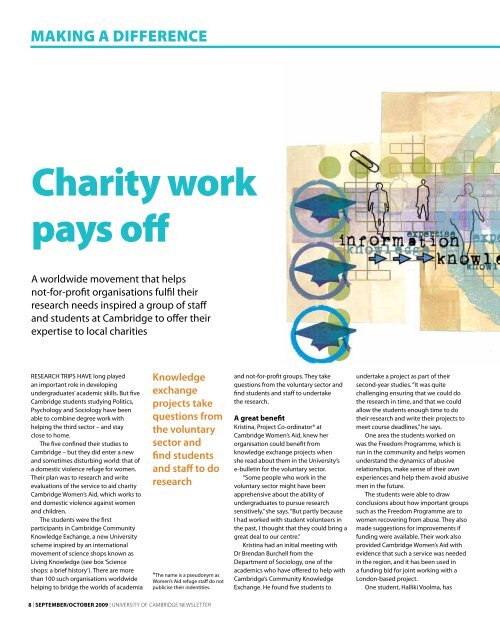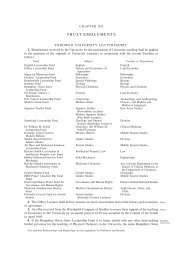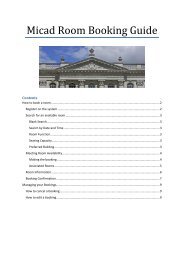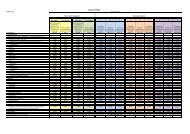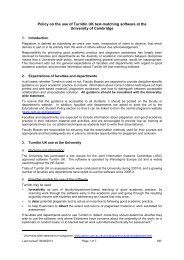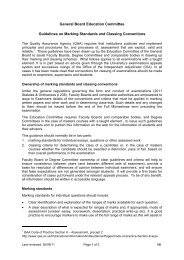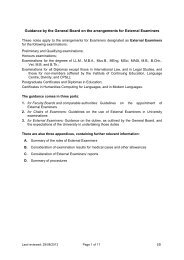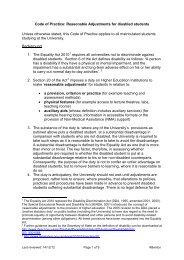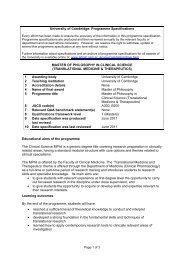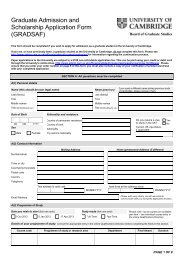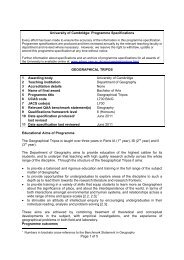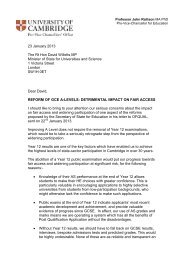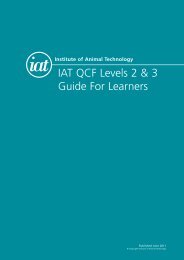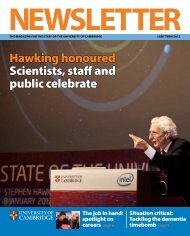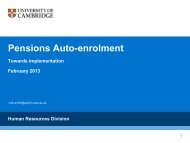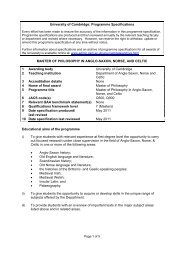Open Cambridge - the University Offices - University of Cambridge
Open Cambridge - the University Offices - University of Cambridge
Open Cambridge - the University Offices - University of Cambridge
You also want an ePaper? Increase the reach of your titles
YUMPU automatically turns print PDFs into web optimized ePapers that Google loves.
making a difference<br />
Charity work<br />
pays <strong>of</strong>f<br />
A worldwide movement that helps<br />
not-for-pr<strong>of</strong>it organisations fulfil <strong>the</strong>ir<br />
research needs inspired a group <strong>of</strong> staff<br />
and students at <strong>Cambridge</strong> to <strong>of</strong>fer <strong>the</strong>ir<br />
expertise to local charities<br />
RESEARCH TRIPS HAVE long played<br />
an important role in developing<br />
undergraduates’ academic skills. But five<br />
<strong>Cambridge</strong> students studying Politics,<br />
Psychology and Sociology have been<br />
able to combine degree work with<br />
helping <strong>the</strong> third sector – and stay<br />
close to home.<br />
The five confined <strong>the</strong>ir studies to<br />
<strong>Cambridge</strong> – but <strong>the</strong>y did enter a new<br />
and sometimes disturbing world: that <strong>of</strong><br />
a domestic violence refuge for women.<br />
Their plan was to research and write<br />
evaluations <strong>of</strong> <strong>the</strong> service to aid charity<br />
<strong>Cambridge</strong> Women’s Aid, which works to<br />
end domestic violence against women<br />
and children.<br />
The students were <strong>the</strong> first<br />
participants in <strong>Cambridge</strong> Community<br />
Knowledge Exchange, a new <strong>University</strong><br />
scheme inspired by an international<br />
movement <strong>of</strong> science shops known as<br />
Living Knowledge (see box ‘Science<br />
shops: a brief history’). There are more<br />
than 100 such organisations worldwide<br />
helping to bridge <strong>the</strong> worlds <strong>of</strong> academia<br />
Knowledge<br />
exchange<br />
projects take<br />
questions from<br />
<strong>the</strong> voluntary<br />
sector and<br />
find students<br />
and staff to do<br />
research<br />
*The name is a pseudonym as<br />
Women’s Aid refuge staff do not<br />
publicise <strong>the</strong>ir indentities.<br />
and not-for-pr<strong>of</strong>it groups. They take<br />
questions from <strong>the</strong> voluntary sector and<br />
find students and staff to undertake<br />
<strong>the</strong> research.<br />
A great benefit<br />
Kristina, Project Co-ordinator* at<br />
<strong>Cambridge</strong> Women’s Aid, knew her<br />
organisation could benefit from<br />
knowledge exchange projects when<br />
she read about <strong>the</strong>m in <strong>the</strong> <strong>University</strong>’s<br />
e-bulletin for <strong>the</strong> voluntary sector.<br />
“Some people who work in <strong>the</strong><br />
voluntary sector might have been<br />
apprehensive about <strong>the</strong> ability <strong>of</strong><br />
undergraduates to pursue research<br />
sensitively,” she says. “But partly because<br />
I had worked with student volunteers in<br />
<strong>the</strong> past, I thought that <strong>the</strong>y could bring a<br />
great deal to our centre.”<br />
Kristina had an initial meeting with<br />
Dr Brendan Burchell from <strong>the</strong><br />
Department <strong>of</strong> Sociology, one <strong>of</strong> <strong>the</strong><br />
academics who have <strong>of</strong>fered to help with<br />
<strong>Cambridge</strong>’s Community Knowledge<br />
Exchange. He found five students to<br />
undertake a project as part <strong>of</strong> <strong>the</strong>ir<br />
second-year studies. “It was quite<br />
challenging ensuring that we could do<br />
<strong>the</strong> research in time, and that we could<br />
allow <strong>the</strong> students enough time to do<br />
<strong>the</strong>ir research and write <strong>the</strong>ir projects to<br />
meet course deadlines,” he says.<br />
One area <strong>the</strong> students worked on<br />
was <strong>the</strong> Freedom Programme, which is<br />
run in <strong>the</strong> community and helps women<br />
understand <strong>the</strong> dynamics <strong>of</strong> abusive<br />
relationships, make sense <strong>of</strong> <strong>the</strong>ir own<br />
experiences and help <strong>the</strong>m avoid abusive<br />
men in <strong>the</strong> future.<br />
The students were able to draw<br />
conclusions about how important groups<br />
such as <strong>the</strong> Freedom Programme are to<br />
women recovering from abuse. They also<br />
made suggestions for improvements if<br />
funding were available. Their work also<br />
provided <strong>Cambridge</strong> Women’s Aid with<br />
evidence that such a service was needed<br />
in <strong>the</strong> region, and it has been used in<br />
a funding bid for joint working with a<br />
London-based project.<br />
One student, Halliki Voolma, has<br />
8 | september/october 2009 | UNIVERSITY OF CAMBRIDGE Newsletter


